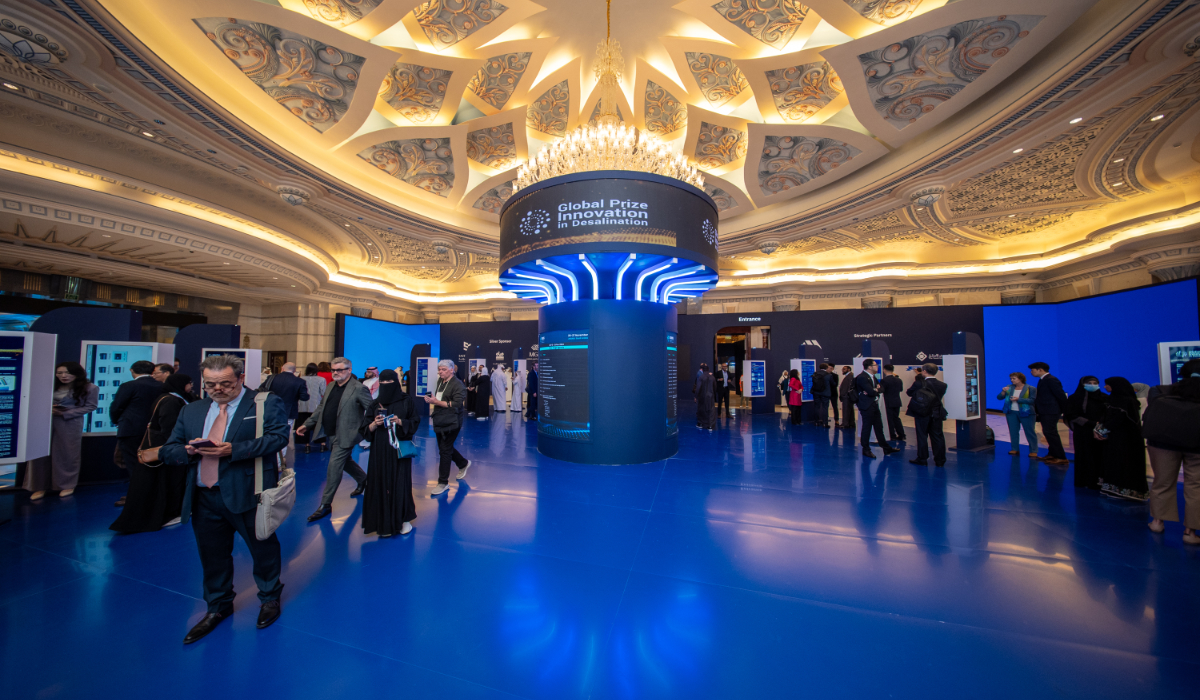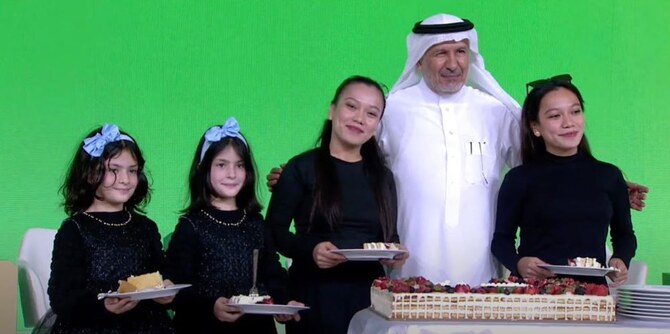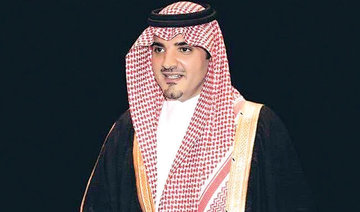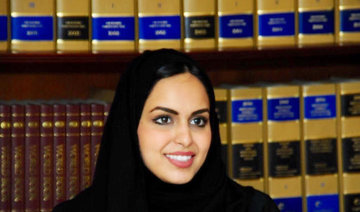LONDON: Women should be “central” to achieving the nation’s ambitious Vision 2030, Saudi Energy Minister Khalid Al-Falih told Arab News on International Women’s Day.
Speaking on the sidelines of the Saudi-UK CEO Forum in London, the minister said that women being able to drive was “insignificant in the wider scheme of things.”
“What matters,” he said, “is making sure that they have access to skills training and access to jobs. What matters is they have access to investment opportunities so we ensure that the power of women is unleashed to represent their great capabilities.”
Al-Falih added: “There is great potential for all Saudi citizens … certainly women will have more than their share, which should be more than 50 percent.”
Saudi Arabia has announced a string of reforms in recent months aimed at improving opportunities for women in the Kingdom. Alongside being able to drive, Saudi Arabia’s women can now join the Shoura Council, license their own businesses and take part in sports, among many other new freedoms in a country that is in the throes of modernization and change.
Speaking at the same event on a panel, Princess Reema bint Bandar, vice president of the General Sports Authority of Saudi Arabia, said that women joining the Shoura Council has allowed for the “escalation of women’s needs.”
Princess Reema added the creation of a sports ecosystem for women would be critical to job creation and female empowerment.
She said: “It will benefit women to be included in sports. We want to focus on the ecosystem – we are looking for females that are engineers in the stadiums or trainers which will enable the athletes, for example … which all leads to the end product of the ecosystem: The female athlete.”
Saudi Deputy Minister of Labor Tamader Al-Rammah told the audience that contrary to some global perceptions, women’s empowerment started in Saudi Arabia in the 1960s with the provision of extensive education for females.
“(Women’s empowerment) has been slow but steady,” she said. “Today we are ready for it and we can see the changes are happening rapidly.”
On the controversial subject of gender quotas, Al-Rammah said: “I think the best way to do it is to have the best person for each position. On the other hand, you should remove all barriers to that position.
“Perhaps after some time, we’ll decide that we need quotas. In the meantime, Saudi Arabian women are not shy and the men support us. I don’t think we will need quotas, we will get there.”
Al-Rammah added that the need to funnel women into the workplace was “urgent.”
“We are in a time where we don’t have time,” she said.
Al-Rammah added 95 percent of new Saudi jobs will require digital skills. She said: “It’s very important to set that online goal now. It’s important women get online. What’s making me not sleep at night is not whether women drive, it’s whether they are equipped for the future digitally.”
‘More than 50%’: Saudi minister reaffirms government call for women’s central role in reforms
‘More than 50%’: Saudi minister reaffirms government call for women’s central role in reforms

Saudi FM pushes for regional stability at G7-Arab foreign ministers meeting

- In his address, Prince Faisal highlighted the ongoing crises in Gaza and Lebanon
RIYADH: Saudi Foreign Minister Prince Faisal bin Farhan took part in an expanded session of the second meeting between G7 foreign ministers and their counterparts from Arab nations on Monday, the Saudi Press Agency reported.
The meeting was hosted in Italy under the theme “Together for the Stability of the Middle East.”
The session, which addressed pressing regional and international challenges, was held with the participation of Saudi, Jordanian, Emirati, Qatari and Egyptian officials, as well as the secretary-general of the Arab League.
In his address, Prince Faisal emphasized the importance of strengthening partnerships to address these challenges effectively.
He highlighted the ongoing crises in Gaza and Lebanon, urging the international community to act immediately to secure a ceasefire, facilitate unrestricted humanitarian aid, and progress toward establishing an independent Palestinian state.
He also called for respect for Lebanon’s sovereignty, and renewed international efforts to resolve the crisis in Sudan and alleviate the resulting human suffering.
The meeting was also attended by Prince Faisal bin Sattam bin Abdul Aziz, Saudi ambassador to Italy, the SPA reported.
Scientists awarded for sustainable water innovation at Saudi conference

- Research aims to improve desalination efficiency
- Makkah’s deputy emir in attendance
JEDDAH: Scientists were awarded prizes for their work in researching desalination and wastewater treatment technologies during an event in Jeddah on Monday.
The third edition of the Innovation-Driven Water Sustainability Conference was attended by 480 experts, scientists, researchers, specialists and 40 leading organizations in the water sector, from 20 countries.
The grand prize — the Global Prize for Innovation in Desalination 2024 — went to Lee Nuang Sim from Singapore’s Nanyang Technological University for his project “uncovering the power of centrifugal reverse osmosis,” and Sue Mecham, CEO of NALA Membranes, for her project “chlorine stable new membranes for sustainable desalination and wastewater treatment/reuse.”

Mecham, from North Carolina, US, spoke to Arab News after receiving her award, saying: “We are honored to be selected for the Global Prize for Innovation in Desalination 2024. Our mission is to bring new membranes to market and reduce the cost and complexity of water purification.”
Meanwhile, Saudi Ghadeer Al-Balawi from the University of Tabuk was another one of this year’s prizewinners with her project “novel heterogeneous catalysts for improving wastewater treatment plants in Saudi Arabia.”
Al-Balawi told Arab News: “I am incredibly honored to be one of the recipients of the Global Prize for Innovation in Desalination 2024. This recognition means so much to me. This project has been conducted at the University of Sheffield with hard work and dedication with the assistance of my supervisor, Dr. Marco Conte.”
The event’s opening ceremony was attended by Makkah Deputy Emir Prince Saud bin Mishal and Minister of Environment, Water and Agriculture Abdulrahman Abdulmohsen Al-Fadley, as well as other senior officials.
Following the opening, Abdullah Al-Abdulkarim, chairman of the Saudi Water Authority, said that the event reflects the Kingdom’s commitment to promoting scientific and research innovation as a pillar for achieving water sustainability and security.
Through the conference, the SWA aims to share the impact of innovation in promoting the sustainable supply of water, according to SWA spokesperson Sultan Al-Rajhi.
“This conference discusses the latest global practices and innovative solutions in the water industry, with the participation of experts, scientists and specialists, who emphasize the pivotal role of innovation in accelerating the future prosperity of water and achieving the Sustainable Development Goals for water and the environment,” he said.
The two-day conference will continue to feature discussions on more than 180 research papers, as well as a water hackathon organized by the Saudi Water Innovation Center.
PSC members visit Gulf Cooperation Council in Riyadh

- The EU and the GCC held a political dialogue session, co-chaired by Pronk and Jasem Albudaiwi, secretary-general of the GCC
RIYADH: Members of the EU’s Political and Security Committee, including its chair, Ambassador Delphine Pronk, and ambassadors of EU member states, paid an official visit to the Gulf Cooperation Council headquarters in Riyadh on Monday.
The delegation was accompanied by the European External Action Service Managing Director for the Middle East and North Africa Helene Le Gal, and EU Special Representative for the Gulf Luigi Di Maio.
The EU and the GCC held a political dialogue session, co-chaired by Pronk and Jasem Albudaiwi, secretary-general of the GCC.
The two parties discussed matters of mutual interest and the need to increase joint efforts to tackle global challenges.
This included the situations in Israel, Gaza and Lebanon, Gulf security and Iran, maritime security in the Red Sea region, Iraq, Sudan and the Horn of Africa, as well as Russian aggression against Ukraine.
The committee delegates and the GCC also agreed on strengthening the EU-GCC regional security cooperation.
The political dialogue constitutes an important step forward following the successful first EU-GCC Summit in Brussels on Oct. 16.
Winners of Arabic language prize honored

- Final results were based on evaluations by judging committees, considering criteria such as creativity, innovation, performance excellence, impact, and achieved outcomes
RIYADH: The winners of the King Salman Global Academy Prize for Arabic Language were recently honored in Riyadh in individual and institutional categories.
The event, held under the patronage of Minister of Culture Prince Badr bin Abdullah bin Farhan, focused on four main areas: Arabic language teaching and learning, Arabic language computing and services through modern technologies, Arabic language research and studies, and promoting linguistic awareness and community initiatives.
The total value of the awards for both categories amounted to SR1.6 million ($426,000), with each winner receiving SR200,000, the Saudi Press Agency reported.
The final results were based on evaluations by judging committees, considering criteria such as creativity, innovation, performance excellence, impact, and achieved outcomes.
The award honors those who excel in serving the Arabic language, recognizing their contributions to preserving linguistic identity, promoting Arab culture, fostering loyalty, and enhancing communication within the Arab community.
Formerly conjoined Filipino twins return to Riyadh 20 years after lifesaving surgery

- Princess Ann and Princess Mae Manzo stayed for more than six months in the Kingdom in 2004 as guests of Crown Prince Abdullah
- Princess Ann and Princess Mae Manzo stayed for more than six months in the Kingdom in 2004 as guests of Crown Prince Abdullah
RIYADH: Twenty years after they were separated in a complex surgery in Riyadh, two Filipino twins have returned to the Saudi capital to celebrate the medical expertise that saved their lives.
Princess Ann and Princess Mae Manzo stayed for more than six months in the Kingdom in 2004 as guests of Crown Prince Abdullah.
They were separated at Riyadh’s National Guard Hospital.
“After our separation, I gained a new appreciation for individuality and independence,” Princess Mae told the International Conference for Conjoined Twins on Monday.

The event is the first of its kind in Saudi Arabia, a global leader in the field.
She was speaking during a panel discussion titled “Exploring the Multifaceted Impacts of Separation: Conjoined Twins and Families.”
The unique story of the Manzo twins proved the central focus of the discussion.
They are now thriving as third-year students in their native Philippines.
“While we still cherish the unique bond we share, it is a balance of gratitude for our shared paths and excitement for forging our path,” said Princess Mae.
The panel invited experts and family members to discuss the medical and psychological challenges of separating conjoined twins, as well as the broader social, educational and emotional implications.
Princess Anne said that the separation deeply impacted her and Mae’s emotional well-being.
“It has made us more self-aware individually, helping us understand our limits by living life separately with different groups of friends, different schools and different workplaces.”
Dr. Gopal Mitra, global lead on disability and development at UNICEF, highlighted stigmas surrounding conjoined twins, warning that an “obsession with normalcy” often leads to harmful stereotypes and social exclusion for those who are perceived as different.
“Stigma arises when we assign attributes and characteristics to groups of people based on our perceptions of difference — how they look, move, behave, or communicate.”
Mitra added that when a mother gives birth to conjoined twins, the family already faces stress and strain.
Strategies to combat negative perceptions include community engagement, the training of frontline workers and role modeling, he said, adding: “Princess Mae and Princess Ann are wonderful role models.”
Mitra said that inclusive education is a foundation for addressing stigma: “Inclusive education respects individuality and tailors learning experiences to the unique needs of each child.”
Dr. Ahmed Bawaneh, deputy country representative at IMC Jordan, highlighted the emotional and psychological challenges faced by conjoined twins and their families throughout separation and recovery.
“The stigma doesn’t go away after the separation. It’s there before, during and after. It’s something the twins and their families have to grapple with for a long time,” he said.
“It is important that we don’t look at conjoined twins as just special cases.”
After separation, long-term rehabilitation poses another challenge, requiring sustained support from mental health professionals, Bawaneh added.
“We must focus on the stressors they face and provide holistic, integrated support that addresses their mental, emotional and physical well-being. The importance of integrated mental health services cannot be overstated.”
The panel discussion served as both a celebration of progress and a call to action.
“The support system that I had was very helpful during the separation and recovery was my family,” the Manzo twins’ mother said.
Her words served as a reminder that behind every medical milestone is a network of caregivers who provide emotional strength, practical assistance and unwavering love.
“Inclusive education and an inclusive society are not just ideals but necessities — because every child deserves the chance to flourish,” Mitra said.
Preparing professionals to address unique patients is crucial, said Bawaneh.
“We must remember that these children and their families are not defined by their circumstances — they are individuals with dreams, challenges and incredible resilience.”



















